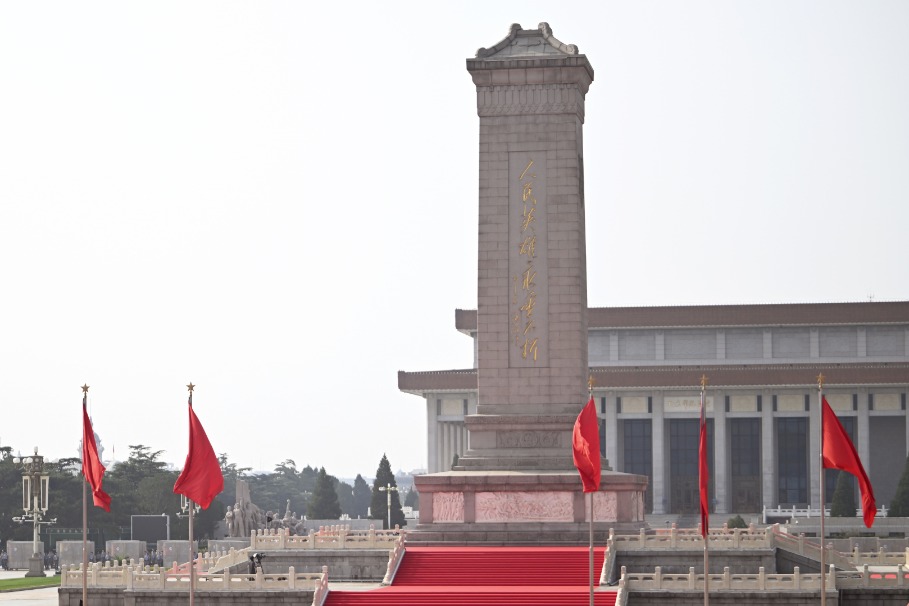More steps to cooperate can stabilize Sino-US relations
By Zhang Wenzong | China Daily Global | Updated: 2024-01-15 09:15

This year marks the 45th anniversary of the establishment of diplomatic relations between China and the United States. Over the years, the two countries have experienced various forms of engagement, cooperation and competition, leading to evolving mutual understanding.
However, what remains unchanged is the clear recognition of the importance of the bilateral relations by both countries and the mainstream public opinion in both countries hoping for sound and peaceful bilateral ties.
China's policy toward the US has maintained a high level of stability. The goal is to build a new type of major country relationship based on mutual respect, peaceful coexistence and win-win cooperation. This aims to create a favorable external environment for the great rejuvenation of the Chinese nation while working together to build a community with a shared future for mankind.
However, in recent years, the US government has viewed a rising China as a "threat" and primary competitor, and has implemented comprehensive containment and suppression measures against it.
Under the impact of a series of major events and issues such as the COVID-19 pandemic, the Russia-Ukraine conflict, a new round of the Palestinian-Israeli conflict, and intense competition between China and the US, the relations between the major powers have become seriously imbalanced, the global economy has suffered severe damage, and international politics have witnessed a retrogression.
If the relationship between China and the US continues to deteriorate and the two countries even enter a new Cold War or military conflict, it could become the final straw that overwhelms the development of globalization, and the international order would undergo the greatest chaos since the end of the Cold War.
Fortunately, both China and the US have recognized the enormous cost of comprehensive decoupling and military conflict, and there is no need to go down that path. Sitting down to talk, clarifying each other's bottom line, and making concessions are responsible actions that benefit both sides and the world. The leaders of China and the US reaffirmed their commitments on major issues, including the Taiwan question, in San Francisco in November, and they have restored institutionalized dialogues. They also have vowed to cooperate in areas such as narcotics control and addressing climate change, successfully stabilizing bilateral relations.
However, the stabilization remains fragile. The erroneous US perception of China and its comprehensive competition strategy has not changed, and China's opposition to US containment measures to suppress its economy will not waver. In 2024, China-US relations will be influenced by a series of factors, which will bring new challenges to managing their differences and competition.
The Taiwan question has always been the most important and sensitive area of Sino-US relations. If the US continues to interfere in China's internal affairs and keeps going down the wrong path of "containing China with Taiwan", China will resolutely defend national sovereignty and territorial integrity and firmly maintain peace and stability across the Taiwan Strait.
The US will hold a presidential election this year, and China will firmly oppose the actions of some US politicians who, driven by electoral needs, hype up the "China threat" and push for new measures to contain China.
Despite growing calls in the US for cease-fire negotiations between Ukraine and Russia, supporting Ukraine to continue fighting remains the basic policy of the US and Western countries. China continues to promote a cease-fire and peace negotiations, and it also opposes US attempts to undermine China-Europe relations by exploiting the Russia-Ukraine conflict, as well as US efforts to provoke bloc politics and confrontations between camps.
Meanwhile, the two-state solution is the only way to resolve the Palestinian-Israeli conflict. Only by establishing an independent Palestinian state can genuine peace be achieved in the Middle East. US support for Israel in creating a large-scale humanitarian disaster regardless of the consequences has been met with dissatisfaction and opposition from China and the majority of countries worldwide.
In the Asia-Pacific region, the US continues to sow discord between China and its neighboring countries, building a military encirclement aimed at containing China. The forward military deployment carried out by the US to win over its allies, the joint military exercises and patrols around China, and close-in reconnaissance have worsened China's security environment, and some have even violated China's sovereignty. The bilateral relationship could take a sharp turn for the worse in the event of a deadly collision between Chinese and US ships or aircraft.
The world is entering a new period of turbulence and transformation, and there may be an increasing number of factors that have an impact on and disrupt the relationship between China and the US. Recognizing the significance of maintaining stability in bilateral relations, both sides are currently investing a significant amount of effort in enhancing communication, managing differences and avoiding conflicts.
How China and the US, the world's two largest economies and permanent members of the United Nations Security Council, coexist in the future is of great significance. China and the US should strengthen unity and cooperation, working together to address global challenges and promote global security and prosperity. Instead of adopting a zero-sum mentality and fueling camp confrontation, the US should work together with China to strive to prevent the world from descending into turmoil and division.
Competition between major powers cannot solve the problems faced by China, the US and the world. The planet is big enough for both China and the US to prosper, and the success of each country represents an opportunity for the other.
The author is deputy director and a researcher at the American Studies Institute of the China Institutes of Contemporary International Relations.
























